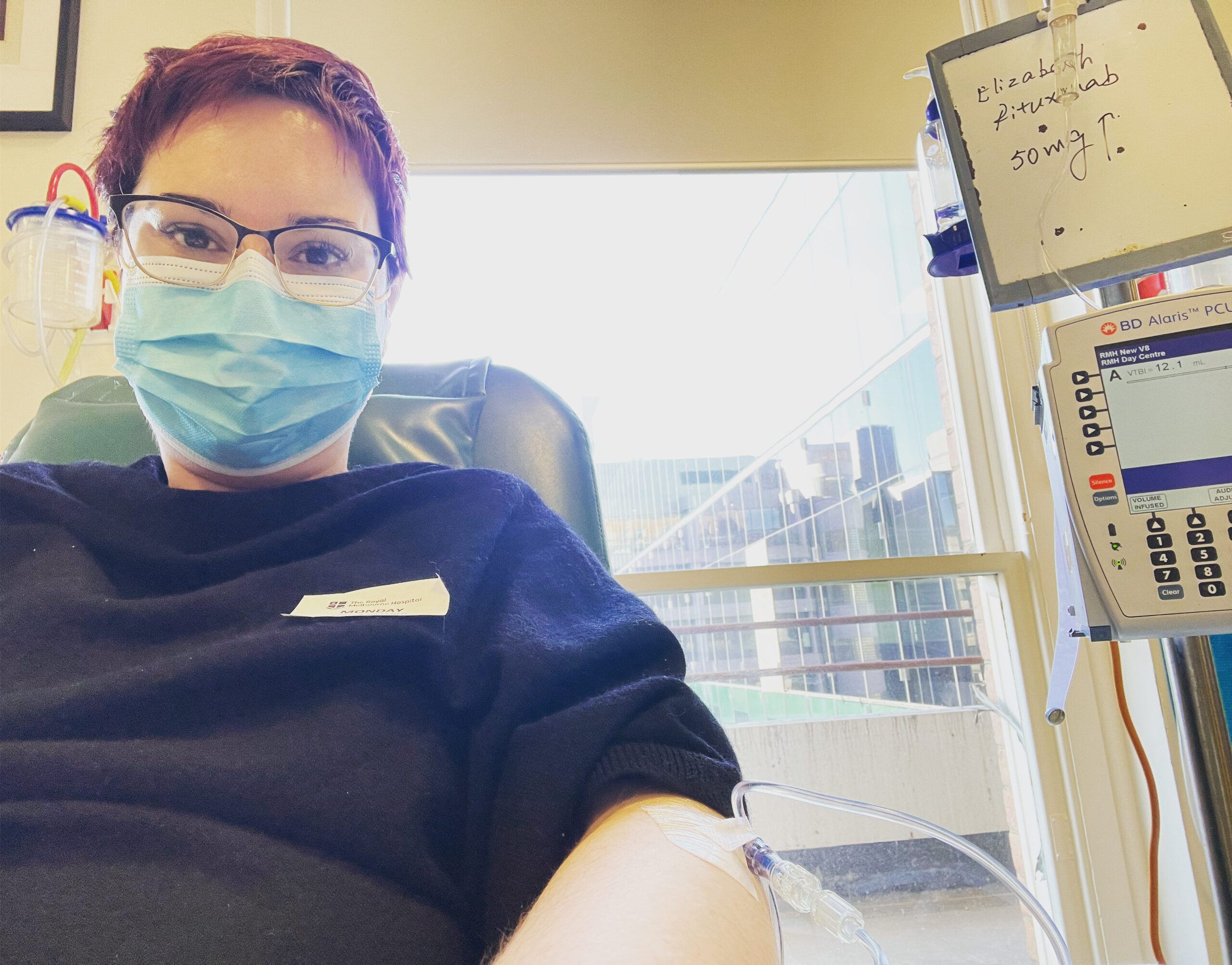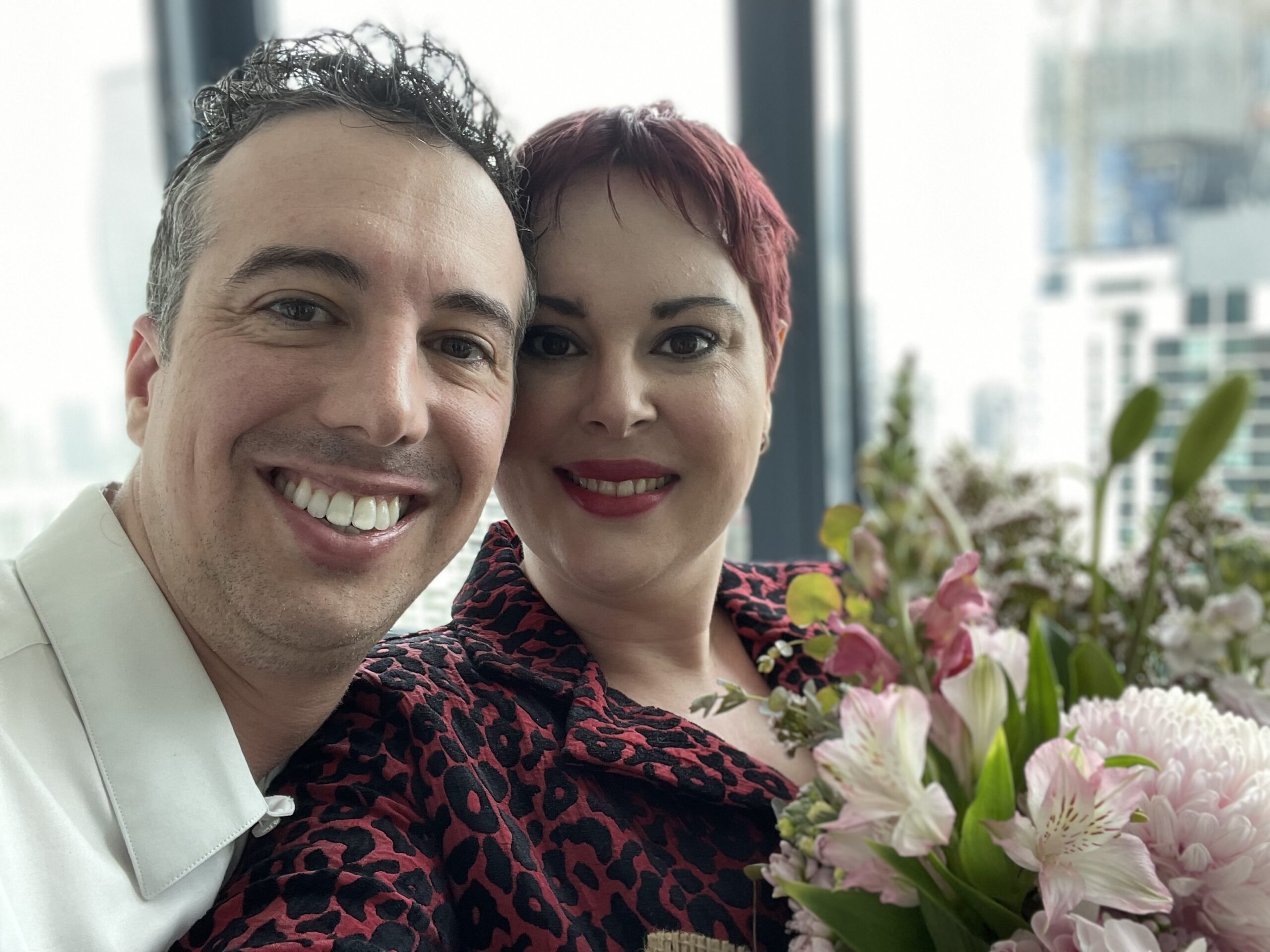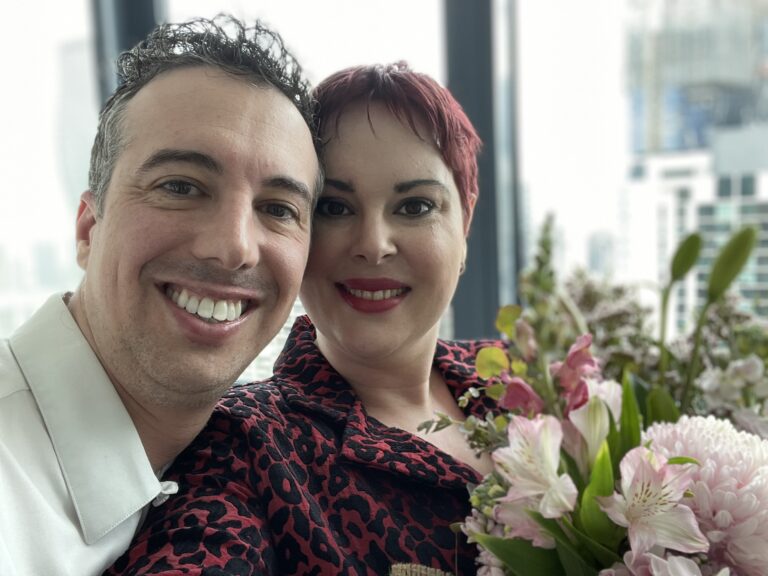I write this sat in the infusion clinic at Royal Melbourne Hospital. I am surrounded by other people, just like me, hooked up to beeping drips slowly feeding their ailing bodies various potions and poisons.

I am a rare disease survivor – can I use survivor? I am still surviving, but I am far from recovered.
The journey so far
In 2019 I became very suddenly very sick (you can read about this here). After almost a month in hospital, and more tests than I can remember, I was diagnosed with a rare autoimmune disease, dermatomyositis (DM). I took two years off work while I worked through a variety of different treatment options, some more successful than others. I was able to return to work part-time in 2021, taking Wednesdays off to recover from my weekly methotrexate injections, which left me feeling nauseous and fatigued for half of the week.
Some people are lucky – they get sick with a disease like DM and are able to recover with treatment, some even go into full remission and eventually are able to stop taking medication. I have not been so lucky.
In hospital, high-dose steroids and IVIG helped bring the disease under some degree of control. The first drug I tried, Imuran, didn’t work, and after nine months of nausea, fatigue, and hair loss, the muscle pain, weakness and fatigue remained. Then we tried methotrexate tablets, but they left me too nauseous to eat and made life miserable. We switched to methotrexate injections, which still cause nausea, but to a lesser degree. Methotrexate was effective, but the damage it was doing to my body was not sustainable – I ended up in hospital with extremely elevated liver enzymes and had to stop treatment. I was lucky – we caught and reversed the damage before any long-term scarring and cirrhosis occurred.
Now, we are trying an off-label treatment, Rituximab. The up-side of this drug is that, if it works, I only need two infusions, and the effects last six months. The downside is that, like all the medications I take to control this disease, it destroys my immune system and leaves me incredibly vulnerable to infections. I am also still taking daily prednisolone, which also damages my immune system, leaves me vulnerable to infections, causes weight gain, swelling of the face, and other metabolic issues. There is no guarantee that this treatment will work.
We are all survivors now
People often tell me how brave I am, how resilient, or how impressed they are by my attitude. I don’t think I am that special – I’m just doing my best to survive. The reality is, in the era of COVID, climate change, and the growing threat of World War, we are all survivors now. We are all doing our best to navigate ambiguity and build resilience, and trying to find joy and reasons to celebrate. I want to share some thoughts with you on these topics – things I have learned over the course of my journey – and I hope that you find these useful.
Navigating ambiguity
My life has been almost totally out of my control for the past three years. My schedule is dictated by the drugs I take, or the treatment I need. I work around specialist appointments and visits to my various doctors. I never know what will happen – will I get an infection, and end up in hospital? Will my disease progress? Will I lose the ability to walk, or swallow, or breathe without oxygen?* Will I get cancer**?
I’ve had to come to terms with my own mortality. A recent webinar by Dr. Rohit Aggarwal, an expert in myositis, stated that the 10-year survival rate for patients with DM is only 53%***This is a confronting statistic. I am only 37 years old – I may not make it to 50. We joke that I am now Limited Edition.
* DM damages the muscles that allow you to walk, and can damage the muscles used to swallow, and can cause something called Interstitial Lung Disease
** The risk of cancer in patients with DM is much higher, particularly if, like me, you have the NXP-2 antibody
*** Prognosis is highly complex and dependent on a number of variables.
So, how do I deal with this kind of ambiguity? My two key strategies are seemingly contradictory, but I believe you need a balance between both these mindsets: plan for the future, and focus on the now.
We are all doing our best to navigate ambiguity and build resilience, and trying to find joy and reasons to celebrate.
Plan for the future
You have to keep going and keep living for tomorrow, even if that tomorrow doesn’t come. The reality is that none of us know how long we have to live. COVID has brought that painful and traumatic reality to life for too many.
Keep making plans! Keep looking forward. I don’t know what impact my disease will have on my career, but I keep setting goals for myself, and milestones to work toward. I am planning to go to Thailand in April – I don’t know for sure that I will be well enough to go, but I have good travel insurance.
Nothing in life is certain – you can’t let that stop you from making plans. Create a vision board; read travel blogs and think about the places you want to visit; learn a new language or musical instrument; set achievable goals at work and look ahead to that role or promotion you want.
Focus on the now
This may seem contradictory to my first piece of advice, but focusing on the now is a great way to deal with ambiguity. When you wake up, ask yourself, what is happening today? How do I feel today? What can I do right now?
I don’t know what tomorrow holds – and worrying too much about what might happen leaves you with too much stress and anxiety. I can’t control what will happen tomorrow, but I can control a lot about what happens today.
“You are what you do everyday” Jon Chu
This is a great quote to live by. Think about the person you want to be (which relates to my first point about planning for the future), and find ways to be that person every day. If you want to read more, find 10 minutes every day to read. If you want to exercise more, find 20 minutes to go for a walk or do some yoga. Focus on what is within the sphere of your control.
Building resilience
I tell my friends and colleagues, BE THE DUCK
The duck swims along, seemingly relaxed – they look calm, cool, collected. Underneath, their feet are paddling furiously. BE THE DUCK, and, in the wise words of Dory from Finding Nemo, just keep swimming. The duck lets things roll off their back, and they don’t sweat the small stuff. They know where they are going, and they keep moving towards that goal. When you are going through a difficult time – BE THE DUCK.
I think the key to resilience is knowing that whatever horrible thing you are going through – disease, distress – it will pass.
“This too shall pass” Abraham Lincoln
Nothing lasts forever – the good and the bad. This too shall pass. You will be ok. Tell yourself, make yourself believe, you can do this for just a little bit longer.
“Grant me the serenity to accept the things I cannot change, the courage to change the things I can, and the wisdom to know the difference” Serenity Prayer
We have much to learn from recovering addicts. The Serenity Prayer, a staple of any AA meeting, teaches us that we cannot control everything. I think this is critical to resilience – if we fight against what is happening to us, we create further stress and anxiety and we make life even harder. Sometimes, we just need to accept that a shitty thing is happening. Recognize and acknowledge that things are shit right now! I can’t change that I have a disease. I can’t change that the world is living through a pandemic. I can’t make people in my building wear a mask when they are in the lift with me. I can’t make people get vaccinated. But I can do things to protect myself – I can wear a mask, get vaccinated, socially distance. I become more resilient through putting in place strategies to protect myself – within the scope of my control.
So, remember, to build resilience, know that this situation you are in is not going to last forever – it will pass. While you are living through it, be the duck – keep your goals in mind, move towards them, and don’t sweat the small stuff. Accept the situation, and don’t fight what you can’t change – look at what you can control, and find ways to protect yourself.
Finding joy and celebrating wins
I want to end on a high note. There is so much in the world right now that is causing us all stress, worry, fear, and anxiety. If there is one thing I have learned on my journey so far it is this: look for, and celebrate, joy.
Life really is too short.
When I was in hospital before Christmas, my partner and I were reminded that “waiting for the right time” may mean that we wait too long, and so we got engaged! We are getting married in April, on a beach in Thailand, with our close family.

Don’t wait for something big – don’t save that bottle of champagne for a special occasion. You might not be here to celebrate if you wait too long. Every single day, find something to celebrate.
I hope you’ve found these tips useful – I know the world out there is scary but, I assure you: you can do this! Please reach out if you have any questions or comments. I’d love to hear from you.
[zombify_post]





0 Comments